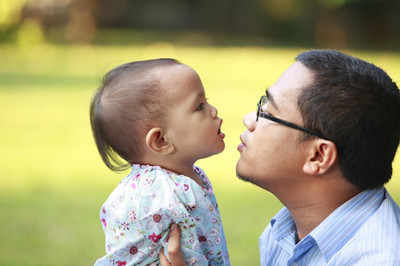(单词翻译:单击)
听力文本
"Babies come prepared to learn any of the world's languages."
Alison Bruderer, a cognitive scientist at the University of British Columbia.
"Which means no matter where they're growing up in the world, their brains are prepared to pick up the language they're listening to around them."
And listen they do.But another key factor to discerning a language's particular sounds may be for babies to move their tongues as they listen.
Bruderer and her colleagues tested that notion by sitting 24 sixth-month-olds in front of a video screen and displaying a checkerboard pattern, while they played one of two tracks:
a single, repeated "D" sound in Hindi,or two slightly different, alternating "D" sounds.
The idea here is that babies have a short attention span, so novel things hold their gaze.
And indeed, the babies did stare at the screen longer while the alternating "D"s played than for the single“D”—indicating they could detect the novelty.
Until, that is, the researchers blocked the babies' tongue movements by having them suck on a teething device.
Then the effect disappeared, with the babies unable to differentiate single D sound from alternating D sounds.
And when the babies used a different teether that did not block tongue movement, they once again appeared to comprehend the difference between the Ds.
The study is in the Proceedings of the National Academy of Sciences.
So is it time to pull the pacifier? "
At this point I don't think that these data suggest parents should be taking away teethers or soothers.
The majority of infants are chewing on something semi-regularly most of the day.
And most of these infants do go on to develop speech normally."
So not to worry.Bruderer says the research might instead offer insight into how children with oral motor impairments or cleft palate perceive speech...
now that we know the tongue really does matter, when first learning a tongue.
参考译文
“小婴儿们与生俱来就做好了学习世界上任何语言的准备。”
英属哥伦比亚大学的认知学家艾丽森·布鲁德雷尔说道。
这意味着无论他们在世界上怎样成长,他们的大脑都已经做好准备随时学习周围听到的语言。
接下来听听这些小婴儿。
但另一个识别语言中特定声音的关键因素可能是婴儿们在聆听的时候会动舌头。
布鲁德雷尔和她的同事们测试这样理论的方式是让24个6个月大的婴儿坐在显示棋盘形图案的屏幕前,而其中播放着一段音轨:一段单一,重复的印度语中的“D”的发音,或着两种稍有不同,交替的“D”的声音。

这里的研究方向是婴儿会有十分短暂的注意力,所以新奇特的事物会吸引他们的目光。
事实上,相比单一出现,交替出现的“D”让婴儿们在屏幕上盯着的时间更长,这表明他们可以检测到新奇的事物。
直到研究人员让他们吮吸出牙设备妨碍婴儿们的舌头运动后。
这样的效果就不复存在,婴儿们无法从交替声音中区分单一的声音。
而当婴儿使用截然不同没有阻碍舌运动的出牙嚼器后,他们再次呈现对于这些声音的理解。
这项研究已经在《美国国家科学院院刊》上发表。
那么是时候拿掉奶嘴了?
在这一点上我认为这些数据并没有表明家长应该拿掉婴儿的出牙嚼器及橡皮奶嘴。
大多数的婴儿在一天中都好有规律地进食。
而且大多数这些婴儿都正常发育,呀呀学语。
“因此不用担心。
布鲁德雷尔表示这项研究反而可能为患有口腔运动障碍或腭裂语音的儿童提供研究方向…现在我们终于知晓当开始学习一种语言的时候舌头真的是一种很重要的器官。
译文为可可英语翻译,未经授权请勿转载!
重点讲解
1.prepare to 准备
例句:He had to go back to his hotel and prepare to catch a train for New York.
他不得不回到酒店,准备赶火车去纽约。
2.grow up 长大
例句:He'll grow up to be somebody.
他长大了一定能成材。
3.stare at 凝视
例句:Don't stare at me,it's impolite!
别盯着我看&这是不礼貌的!
4.appear to 似乎
例句:On Capitol Hill, senators today appear to view the matter as something of a tempest in a teapot.
美国国会的参议员们今天似乎把这个问题小题大做了。


